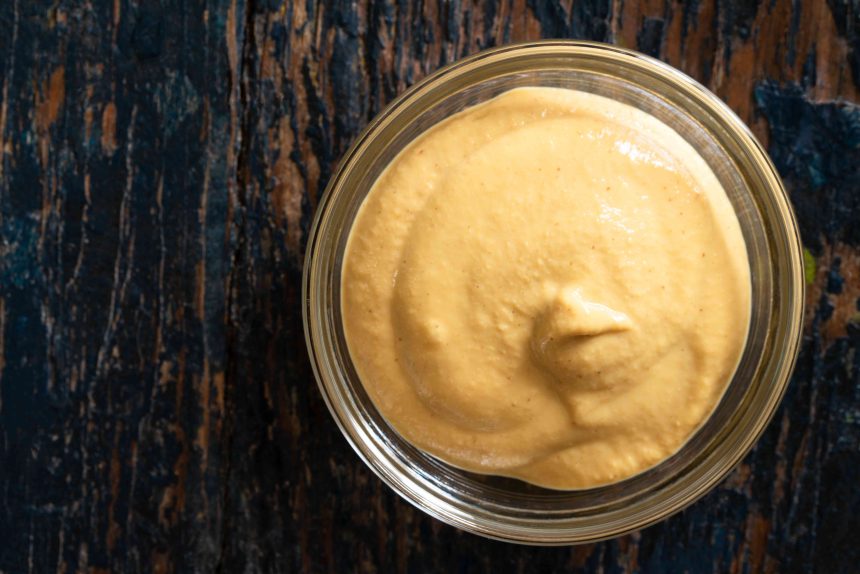Is there such a thing as a Dijon mustard substitute? Mustard mavens who delight in slathering this pungent condiment on everything from French fries to ham and cheese sandwiches may be hard-pressed to come up with an alternative, and with good reason: There’s nothing quite like the distinctive taste of the real thing. Still, sometimes your recipe calls for a dab or two, but there is no Dijon in your pantry—or perhaps you’re itching to experiment. Whatever the case, there are worthy stand-ins. We connected with culinary experts to learn more about how best to replace Dijon mustard.
- Brandon Collins, Unilever corporate executive chef, and mustard sommelier for Maille, a condiment brand renowned for its Dijon mustard
- Ann Ziata, chef at the Institute of Culinary Education‘s New York City campus
Dijon Mustard Explained
In the realm of condiments, Dijon mustard is coveted for what it can bring to the table, either as an ingredient or a topping. “Dijon mustard is loved for its strong, pungent flavor,” says Ann Ziata, chef at the Institute of Culinary Education’s New York City campus. Other hallmarks include its creamy texture, rich color, and smooth finish. Originating in Dijon, France, it’s made all over the world.
Mustard containing black or brown mustard seeds, verjus or white wine, plus vinegar, salt, and water, can be called ‘Dijon,’ explains Brandon Collins, mustard sommelier for Maille, a condiment brand that’s been making its traditional Dijon mustard since 1747, when La Maison Maille was founded in France.
Dijon vs. Yellow Mustard
While Dijon is made with brown mustard seeds, yellow mustard is made from (surprise) yellow mustard seeds, sometimes referred to as white outside of the States. “Yellow mustard seeds have a much more mellow flavor than brown mustard seeds,” Ziata says.
Dijon Mustard Substitutes
“If you’re fresh out of Dijon, it’s not the end of the world (in theory!); you can use other mustards that have some similarities,” Collins says. As with any ingredient swap, personal taste may dictate the right amount.
Stoneground mustard: “The best substitute for Dijon is stoneground mustard, which is also made from spicy brown mustard seeds,” Ziata says. “It’s ground slowly at a low temperature, which allows for more potent flavors to be released.” This type of mustard is sometimes called grainy mustard, due to its rough texture. Trade it for Dijon one for one and try it in our Braised Pork Chops or use it as an emulsifying agent in our Honey-Balsamic Vinaigrette.
Spicy brown mustard: Collins recommends replacing Dijon with Cajun or spicy brown mustard, replicating the measurements almost one for one. Ziata agrees with the spicy brown alternative but holds back a bit. “Just add a little less than you normally would with Dijon,” she says. Sub it for Dijon in our Virginia Ham With Honey-Mustard Glaze or our Classic Egg Salad.
English mustard: Colman’s English Mustard, made with brown and white mustard seeds from Norwich, England, and sold as a prepared mustard, and a dry powder, is another contender in Collins’ book. “You could use Colman’s, but you are going to get something a little spicier than some Dijons on the market,” he cautions. Depending on the Dijon brand you’re accustomed to, you may want to scale back the amount of Colman’s mustard you add to recipes, he says. Try experimenting with our Apricot Dijon Glazed Chicken, which tempers the condiment’s heat with sweet apricot jam, or our Barbecued Baby-Back Ribs.
Horseradish mustard: “Horseradish mustard is also a great substitute, especially for grilled foods, slaws, and potato salads,” Ziata says. Add a smidge to our Kale Salad With Red Cabbage and Carrots or spike our French Potato Salad with a soupçon.
Chinese mustard and Düsseldorf mustard are among the many other mustards made with brown mustard seeds, to hot or spicy effect.
Horseradish: Prepared horseradish, made from the grated white root of the horseradish plant, can also replace Dijon mustard, bearing in mind that there’s nothing subtle about this peppery powerhouse. “You can also substitute horseradish sauce for Dijon—they are both similarly pungent, spicy, and creamy,” Ziata says. Horseradish sauce is typically a mixture of prepared horseradish with mayonnaise, sour cream, or Greek yogurt.
If a recipe calls for a large amount of Dijon, she adds, you may want to use less horseradish sauce since the flavor is so concentrated. Sample our yogurt variation, the perfect enhancement to our Rosemary-Garlic Roast Beef.








